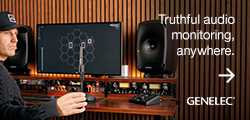Cedar Audio has announced Cedar Cambridge v11, which adds three new forensic audio enhancement, dialogue noise suppression and restoration modules to nearly 30 other processes in its noise reduction/audio restoration system.
 Aiming for simplicity of operation and speed of use, each of the new processes requires the minimum of set-up and adjustment, where possible offering Learn and Auto functions to determine the optimum processing parameters. Cedar Cambridge v11 is aimed at applications in audio forensics, archives and libraries, postproduction, and for pre-mastering of difficult material.
Aiming for simplicity of operation and speed of use, each of the new processes requires the minimum of set-up and adjustment, where possible offering Learn and Auto functions to determine the optimum processing parameters. Cedar Cambridge v11 is aimed at applications in audio forensics, archives and libraries, postproduction, and for pre-mastering of difficult material.
Derived from the Cedar Trinity surveillance system supplied to law enforcement and security agencies, Trinity Enhance has been designed specifically for audio forensic use. It provides four related tools that allow users to suppress background noise, reveal voices and increase the intelligibility of speech using four sliders. It also allows enhancement of background if that contains wanted detail.
A success within the DNS 2 hardware unit released earlier in 2016, using DNS Two requires switching on Learn (which allows the algorithm to calculate and adapt to the changing noise contained within the signal and determine suitable parameters) and then adjusting the attenuation to obtain the desired amount of noise reduction.
Declip-2 replaces and improves upon the original Declip algorithm supplied up until Cedar Cambridge V10. As before, the process identifies and removes most instances of clipping in a single real- time pass but with its new, adaptive Auto mode (which identifies the clipping point and even tracks changes in the amplitude at which clipping occurs) eliminating the distortion and restoring the original dynamic range of the signal only requires clicking on the Auto button. Manual controls are also supplied for tweaking the results if desired.
Cedar Cambridge v11 will ship on the latest Cedar Cambridge Series IV host systems running Windows 10 Pro 64-bit. It will run on all previous Series IV hosts as well as Cedar Cambridge Series III hardware (with a new video card) running Windows 10 Pro 64-bit or Windows 7 Ultimate Pro. Some earlier systems may support Cedar Cambridge v11, but performance will be compromised and some features and modules will not be available.
More: www.cedaraudio.com









